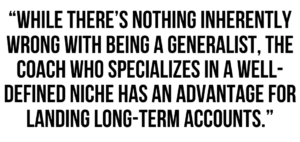•••
- Amp Up Your Networking
It’s no secret that networking remains a key way to find a job or grow a business. Yet despite this common knowledge, too many coaches tend to neglect networking, with the pandemic magnifying this tendency. If you’re not networking like you should, this is the year to reorder your business development priorities.
For Ashleigh Miller – a certified executive coach specializing in team coaching and team dynamics – networking is an essential aspect of her business and professional growth. She comments: “I think the biggest thing for me is good old-fashioned networking and keeping up connections with people: staying on people’s radar, telling anyone who will listen what I’m doing with my life, going to breakfast and lunch meetings, and going to networking events when it’s safe to do so. Also, saying ‘yes’ to every introduction someone wants to make has been fantastic.” Ashleigh also offered this useful tip: “On networking Zoom calls, I take screenshots of everybody who’s participating. Afterwards I look them up on LinkedIn. I’ve made lots of connections that way.”

- Guarantee Your Coaching
It might seem unrealistic, if not impossible, to guarantee the results of your coaching to your clients, but that’s exactly what Sadaf Shaikh – founder and president of Caras Consulting in Toronto, does with all her clients. “I learned the hard way that in consulting and coaching, your reputation is critical,” noted Sadaf. “If you end it with a client who’s not 100% satisfied that they’ve got everything they could from working with you, they’ll feel short-changed. I give them a guarantee I’ll continue working with them until they achieve their outcome. I think offering this guarantee plays a big part in getting referrals and building a reputation in general. When I’ve talked to other consultants and coaches about offering a guarantee, they often scoff: ‘Oh, but you can’t do that because clients will never be satisfied.’ But that hasn’t been the case. In my experience I’ve never stayed on with a client longer than I thought was necessary.”
- Get Your System Up and Running
Your “system:” how you prioritize tasks and get work done, must be a cornerstone of your coaching practice. Therefore, the sooner you can define that system and get it up and running, the more effective your coaching will be. Sadaf Shaikh, who gave us tip number 2, is a huge proponent of establishing a business system and putting it into action.
She comments: “I love systems. I’m a big process person. It’s what I tell my clients as well, because when you have a process in place there’s less likelihood of you not doing the thing that you’re supposed to. I’m also a huge procrastinator. I find it so easy to procrastinate on stuff, especially when you have your own business because you don’t have a boss. So, I feel like the more processes I have, the fewer excuses I have to procrastinate.”
- Don’t be Intimidated by a Client’s Role or Title
As a leadership coach, it’s possible you’ll engage with many top-level executives at successful companies or corporations. When coaching a high-powered executive earning 7 figures a year, it’s understandable to feel intimidated by their power and position, but that needn’t be the case at all. “I’ve seen that the most senior people still struggle with everyday issues,” observed Craig Coffey, an ICF credentialed professional certified coach with experience working with Fortune 300 clients.
Craig noted: “These executives struggle with obstacles, conflicts, and limiting beliefs. Despite that, they continue to carry on and move forward. I think the common misconception about really senior executives is that they somehow have it all. They somehow have it all figured out. But that’s just not the case. Often they find that they don’t have as many people to talk to or reveal their vulnerabilities to. So, being able to connect with them in an authentic human-to-human way is a really great place to start a coaching relationship.”
- Realize We’re in the “People Business.”
The business landscape is often defined by technology and the bottom line, but ultimately, it’s all about people and their interaction with other people. The savvy leadership coach understands that human interaction, and emotional intelligence, are the driving forces behind all coaching, and that clientele should be engaged accordingly. 
Trevor Blondeel, coach and founder of the coaching firm Operations Kickstart, has vividly seen the value of building a people-centric coaching practice: He stated: “After years of manufacturing experience, I started to realize my success was actually measured by the people around me. I realized: I’ve got to engage with people, I’ve got to connect with them. That’s where all the magic happens. I also realized I needed to talk less, listen more, and care a lot more about the people I worked with, and show them that I cared. As coaches we’re really in the ‘people business’ more than anything else.”
- Get ICF Certified
If you’re not certified by the ICF, International Coaching Federation, now’s the perfect time to acquire this valuable credential. For Daiana Stoicescu, an executive coach based in Romania, ICF certification is essential to her business. She commented: What I notice now in Europe, especially, is clients are looking for coaches who are certified by the ICF. They seek coaches who follow a structure and follow a code of high ethical conduct. For a coach, it’s really important to obtain that ICF credential. It reassures clients that they’ll receive real value from working with you.”
- Find Your Niche
While there’s nothing inherently wrong with being a generalist, the coach who specializes in a well-defined niche has an advantage for landing long-term accounts. Daiana Stoicescu, who also gave us tip number 6, is a big believer in the value of coaching within a niche: “ I think it’s crucial to find your niche,” she said. “And that knowledge is also advantageous to the coach’s income, because when you’re specialized, leaders will come to you for a specific situation, something they’re often willing to pay more for. And I think your niche will find you. It’s always there. All you have to do is open your eyes and see it. Just think about what brings you joy. What do you do effortlessly? Start with things that come easily to you and then expand from there. Your niche will become clear.”
- Know Thyself
What Socrates advised thousands of years ago rings true today, and these two words are powerful advice to leadership coaches. Mike Williams is the owner and president of The Growth Coach of Northern Virginia, offering strategic planning, business development and sales training to small businesses, corporations, executives, and sales teams. Mike is a huge proponent of self-knowledge, as he explained in his interview with us: “I feel coaches need to know themselves really well. What are your areas of expertise? What are you good at? What are you not so good at? Learn about yourself by taking a class, a test, whatever it takes. Other things I stress are: be genuine, listen well, and work to solve problems instead of trying to sell people on something. Be a solution, and a true support person.” 
- Learn How to Sell
When you think about it, selling is central to everything we do. We sell our coaching services to our clients who in turn sell their products or services to their clients. But despite this obvious relationship, many coaches lack sales skills themselves. Mike Williams sees this as an area where coaches need to improve, and training is the key: “if you’re a coach, you want to be an influencer. You need to have that selling skill. But we know that it’s a different kind of ‘sell.’ You don’t want to talk people into hiring you as a coach simply because you think they should. They have to reach that conclusion for themselves.
That’s why I think sales training is very important for coaches. It’s great you’ve been in business your whole life and now you’re going to help business owners, but first, you need to know something about the art and the science of selling, and be able to do that in a way that’s problem solving. If you don’t have a background in sales, you need to get some training in that area.”
- Don’t Be Afraid to Ask
Often our own inhibitions and self-doubts can inhibit professional growth. But by adopting a more tenacious and self-confident mindset, you can overcome these tendencies. Terr Citterman, executive coach and author of From the CEO’s Perspective: Leadership in Their Own Words, found that simply asking the high-profile executives she coached for assistance and guidance yielded some remarkable results. This tactic proved especially valuable for Teri when researching and writing her book. Teri notes: “The number one thing to remember is: if you don’t ask, you won’t get. Just ask people. You’ll be surprised at what they’re willing to do. When I was writing my book I was surprised at how trusting some of those CEOs were with their content becoming my content. I was shocked, actually, by the way they really trusted me on that. The most important thing is you have to ask. Don’t shy away.”
Those are just some of the useful ideas these accomplished executive coaches shared with us in their interviews. You’ll find all the interviews posted in their entirety in this same blog section. As we progress into 2022, consider incorporating these ideas into your own practice and way of operating. They will surely help you be an even more successful executive and leadership coach. We plan to continue interviewing successful coaches this year so stay tuned for more great ideas to help you build your executive coaching practice. To see these interviews and more quality content, visit our YouTube channel. To learn more about our executive coach training and certification programs, visit our Enrollment Options page.
Want to learn more about the secret to achieving greater success in executive coaching? Read our positive momentum article!
Photo copyright: Featured photo is from ©Antonioguillem via 123RF. Second photo is from ©fizkes via 123RF.







